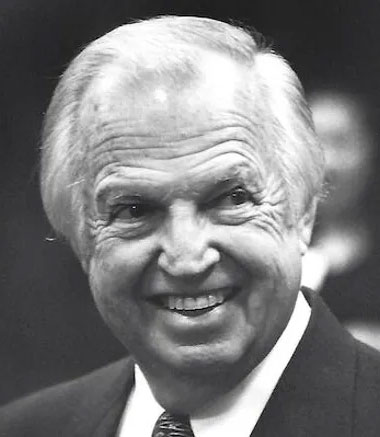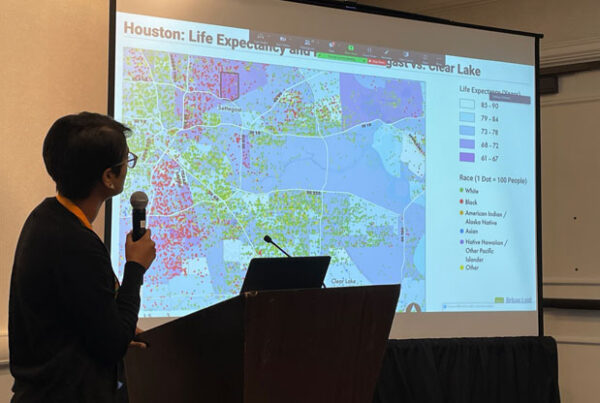Wayne S. Doran passed away in early February at age 87 in Dearborn, Michigan. Doran was a ULI Life Trustee, Foundation governor, and a longtime product council member.

Wayne S. Doran
Doran’s business acumen helped develop landmarks such as Detroit’s Renaissance Center, the Fairlane Town Center community, and the TPC Michigan golf course development in Dearborn, in addition to West Coast developments such as Irvine Ranch and the conversion of a Ford assembly plant into the Great Mall of the Bay Area outside San Francisco. His initiative is often credited with bringing a ULI District Council to Michigan in 1997.
“Wayne was always there for his friends and built Ford Land into one of the most successful corporate real estate enterprises in history. The truest testament to the depth of his impact was the reverence and presence he maintained even after his retirement,” said Eric Larson, president and CEO of the Larson Realty Group and CEO of the Downtown Detroit Partnership.
“Many of us were blessed by his intellect and openness to our own personal growth,” said Larson, who also serves as chairman of The Robert C. Larson Leadership Initiative and ULI Michigan’s Governance Committee.
“Everyone in the country in economic development knew about Wayne Doran,” said Emmett Moten, a former Detroit economic development director under the late Mayor Coleman Young. “The guy was a real estate visionary. But he could execute his vision. Not everybody could do that. And he could put together a financial package to sustain it.”
A Phoenix, Arizona native, Doran graduated from Arizona State University and went to work for hometown John F. Long Homes. In 1963, he joined Del E. Webb Corp.’s Community Development Division and was a vice president in 1969 when Ford Motor Co. chairman Henry Ford II handpicked him as the first chair of Ford Land.
With Doran working behind the scenes, Henry Ford II orchestrated the landmark deal to erect Detroit’s Renaissance Center along the city’s riverfront, its name symbolizing the efforts to rebuild and rebound from the city’s devastating 1967 civil unrest.
“Doran helped cobble together the complex partnership of 51 investors needed to make the RenCen a reality and oversaw planning and construction,” wrote Detroit Free Press staff writer John Gallagher in a 2006 article titled “The Man Who Changed the Face of Detroit.” “The building on the downtown riverfront instantly became the city’s postcard image.”
Robert Taubman, chair and CEO of the Taubman Centers which owns 27 shopping centers, called Doran “extremely confident and capable.” Taubman’s father, the late Alfred Taubman, worked with Doran on creating the Fair Lane Town Center in the 1970s on some 2,400 acres of soybean fields once cultivated by auto pioneer Henry Ford in Dearborn, just outside of Detroit.
Doran “did not have to be the center of the room, but he was able to accomplish a great deal,” said Taubman. “He really was a quiet giant in this community.”
Henry Ford II so valued Doran’s skills that he made Doran a Ford Motor Company vice president, “which was very unusual with Wayne being a non-car guy,” said Taubman. “He had tremendous resonance and clout within Ford.”
Ford’s backing was essential in making development ideas a reality, Doran acknowledged.
“The three elements of development are the land, the money and the management, and when you have all three in one control point, it should be easy and very possible to do a first-rate job,” Doran said in the 2006 Free Press article.
“Mr. Doran played a significant role in creating developments that had lasting impact across communities around the world,” Ford Land said in a statement. “He leaves a lasting legacy and we are forever grateful for his leadership and contributions to Ford Land.”
Matt Cullen, a former General Motors manager of economic development and chief architect in 1996 of General Motors’ purchase of the Renaissance Center, praised Doran as a pioneer.
“We were competitors in a sense, but he was always very supportive,” said Cullen, now chairman of Jack Entertainment and the Detroit Riverfront Conservancy, which has redesigned the city’s riverfront on groundwork laid by Doran. “We were both corporate real estate folks, and he took the field to a much more professional and strategic role with community engagement.”
Mark LoPatin, president of real estate broker/developer LoPatin & Co., says “the reason ULI Michigan is in existence is because of Wayne.”
“He formed a committee which met in his office and he planned the inaugural meeting on June 26, 1997, and made the opening remarks” for the regional gathering, said LoPatin. LoPatin also credits Doran’s fundraising prowess for sparking the chapter’s growth from a few members to more than 400.
Doran was keen on molding talent and hired Ronald Lynn not long after the onetime English teacher acquired an M.B.A.
“Wayne Doran was one of the most gracious people that I have ever met. He had a ready smile, a quick wit and made everyone feel comfortable. Without Wayne Doran there would not have been a Ford Motor Land Development Company or a Renaissance Center,” wrote Lynn, who had a 30-year career at Ford Land. “He was a giant in the real estate industry and a true believer in the goodness of people and the importance of family. He taught me to do the best I could. If things worked out, be pleased with your accomplishments, but don’t gloat. If things didn’t work out, let it go and go on to the next one.”
Doran was involved in multiple deals in the Detroit area, such as the building of Ford Field, the stadium which brought the Detroit Lions football team from the Pontiac Silverdome back to downtown, and the McNamara Terminal at Detroit Metropolitan Airport. Golf also was one of Doran’s passions. He brought the first Tournament Players Club (TPC) golf course to Michigan. TPC Michigan was designed by Jack Nicklaus, opening in 1990 on a 2,400-acre (971.2 ha) plot of land in view of Ford’s world headquarters. The course has hosted 16 PGA TOUR Champions events.
Doran was chair of the PGA TOUR’s Golf Course Properties Advisory Board from 2001 to 2007.
Doran “was ideally suited to serve on our Golf Course Properties Advisory Board,” said former PGA TOUR Commissioner Tim Finchem for pgatour.com. “He had such a sound business judgment, and after I became Commissioner, I significantly relied on Wayne and his expertise in many different areas of our business”
With a $1 million gift in 1997, Doran established the Doran Community Scholars Program at Arizona State University to benefit first-generation college students who graduated from the Phoenix Union High School District. More than 200 ASU students have received scholarships since, according to ASU.
“Wayne Doran’s life speaks to the power of the ‘American Dream’ and the transformative power of education,” ASU President Michael M. Crow said in a prepared statement. “His personal experiences as a first-generation college student, Fortune 500 executive and community leader fueled his family’s education advocacy and decades of generosity in support of his alma mater and the Doran Community Scholars. Wayne’s friendship, compassion and steadfast dedication to supporting student success will be greatly missed.”
Doran is survived by his wife, Maureen, and three children, Roselle Brown, Susan (Joel) Reisner, Randy (Lisa) Doran; and three grandchildren. He was predeceased by his daughter, Rhonda Doran, and his grandson, Wayne A. Doran. Services were held February 17 in Dearborn.


